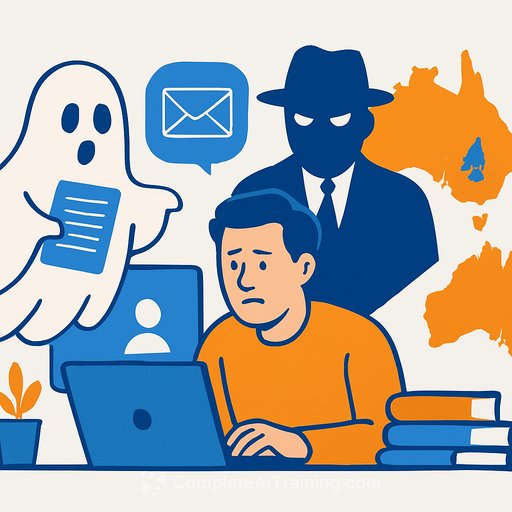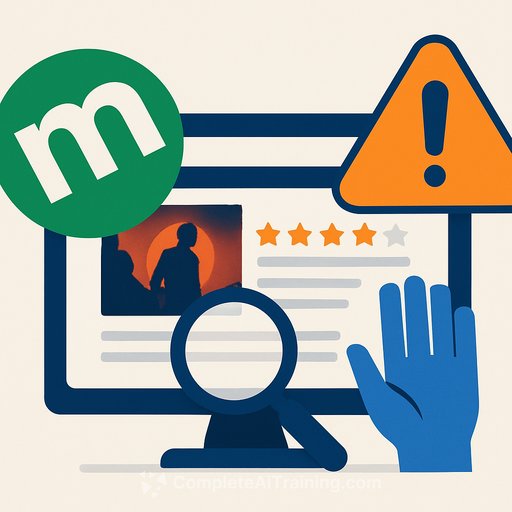Lost in the plot: AI-fueled publishing scams are targeting writers across Australia, the UK and New Zealand
Writers are being pitched by a cluster of slick-looking "publishers" using AI headshots, cloned websites, and virtual office addresses to win trust - then push paid packages. Names tied to the operation include Melbourne Book Publisher, First Page Press (UK), Aussie Book Publisher, Oz Book Publishers and BookPublishers.co.nz.
The setup looks legitimate at first glance: polished "meet the team" pages, glowing testimonials, and big-city addresses. Look closer and patterns emerge - new domains claiming decades of history, AI-generated staff photos, and books showcased that were actually published elsewhere.
The confusion play: similar names, borrowed credibility
One site trading as "Melbourne Book Publisher" has been mistaken for the well-known independent publisher Melbourne Books. They even referenced the same ABN, adding to the confusion. Melbourne Books has issued public warnings and says its office has fielded calls for "Marcus Hale" and "Hannah Preston," names used by the lookalike operation.
A UK-linked site, First Page Press, listed addresses in London and Melbourne and showcased titles that belong to a US self-publishing company, Atmosphere Press. Its CEO called the practice "brazen theft" and issued a cease and desist.
Real writers, real losses
Andrea*, a first-time author from Western Australia, had a video call with someone calling himself "Marcus Hale." They talked contracts, promo plans, and a book launch. She paid $88 she was told would secure an ABN - then discovered she'd been dealing with an imposter.
When she questioned the company and asked for proof, she received threats to cancel her bank dispute - and the ABN she was sent belonged to Melbourne Books. Another WA writer, Peter Ortmueller, says he lost $150 before realizing he'd hit a vanity-style upsell and not a traditional publisher.
AI faces, fake testimonials, and virtual offices
The "meet our team" pages used AI-created portraits paired with rotating names. After inquiries, multiple sites pulled those images. Some testimonials lifted photos of real authors and attached new names and quotes that didn't match their work.
Each site listed premium business addresses across Melbourne, Brisbane, London and Wellington. Those locations are serviced offices - easy to rent, and used by many unrelated companies. It adds polish without proving anything.
Self-publishing vs vanity publishing (and why that distinction matters)
Self-publishing means you act as the publisher: you pay for services you control, keep rights, and own the upside. Vanity publishing flips the incentives: you pay a large fee up front and often get weak distribution, little editorial rigor, and pressure to add more services.
Experts warn that AI now makes deception easier - scammers can remix text, fake faces, and spin up convincing sites fast. That demands higher verification standards from authors, especially when upfront payments or "rush to sign" tactics appear.
Red flags to watch before you send a manuscript or money
- New domain claiming a long history (e.g., "established in 1999" but registered last month).
- "Team" photos that look AI-generated or too uniform (perfect lighting, generic backdrops, no consistent LinkedIn presence).
- Borrowed credibility: similar name to a known publisher, reused ABN, or book lists that belong to other presses.
- Pressure to pay small "setup" fees, followed by tiered packages ($1,500-$5,000+) for vague deliverables.
- Fake star ratings, missing or zero reviews on platforms they cite.
- Serviced office addresses presented as headquarters, with no verifiable staff on site.
- Inability or refusal to connect you with real authors they've published who can verify royalties and outcomes.
How to verify a publisher (quick checklist)
- Search company and staff on LinkedIn. Do roles, dates, and networks look real?
- Check domain age and history. New site claiming decades of backstory is a red flag.
- Validate business numbers via official registries (e.g., ABN Lookup in Australia). Match name, entity type, and status exactly. ABN Lookup
- Ask for ISBNs and royalty statements for books they claim to have published. Verify those ISBNs with the actual authors.
- Cross-check Amazon listings. If they claim a title, confirm who the listed publisher is on the product page.
- Call a known, established publisher they're "similar" to. Confirm there's no affiliation.
- Request a contract sample. Look for rights grabs, vague distribution promises, and payment schedules that front-load your risk.
- Insist on references from two authors published in the last 12 months. Speak to them, not just email.
If you already paid
- Contact your bank immediately and file a dispute/chargeback. Provide screenshots, emails, invoices, and chat logs.
- Report to your national scam authority to help disrupt networks. In Australia, use Scamwatch. Report at Scamwatch
- Send a written demand for refund and data deletion. Keep a record of all communications.
- If your books or identity were misused, notify Amazon or other retailers with evidence.
- Warn peers in your writing groups and local bookstores to prevent further losses.
Legit alternatives that protect your rights
- True self-publishing: hire vetted editors, designers, and marketers; keep rights and accounts in your name.
- Reputable hybrid presses: transparent vetting, curated lists, clear royalty splits, contract clarity, named distribution partners.
- Traditional submissions: research the imprint, find agented routes where appropriate, and confirm listing in recognized industry directories.
Bottom line
A video call isn't proof. A shiny address isn't proof. A familiar-sounding name isn't proof. Your best defense is verification on every claim - before a single dollar moves.
If a deal promises fast-track publication with hazy details, slow down. Ask harder questions, verify independently, and protect your rights like your career depends on it - because it does.
Level up your AI literacy (ethically)
AI can help you market and manage your author business - and it's also how bad actors scale deception. If you want to use AI ethically for your platform, audience growth, or workflow, explore practical courses curated by job role. See AI courses by job
*Name changed for privacy.
Your membership also unlocks:





